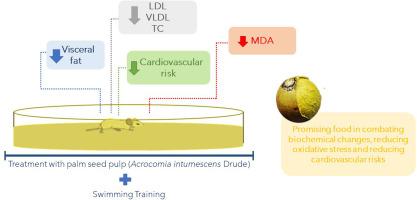Consumption of Brazilian palm fruit (Acrocomia intumescens drude) improves biochemical and gut microbiome parameters, reducing cardiovascular risk in exercised rats
IF 2.5
3区 医学
Q2 BEHAVIORAL SCIENCES
引用次数: 0
Abstract
Objective: This study aimed to evaluate the effects of macaiba pulp on physical, biochemical, intestinal health, and oxidative stress parameters in exercised rats. Methodology: Forty-four male rats were divided into four groups (n= 11): sedentary control (CT), exercised control (CT-EX), sedentary macaiba (MC), and exercised macaiba (MC-EX). MC and MC-EX groups received 1000 mg/kg/day of macaiba pulp, while CT and CT-EX received distilled water for eight weeks. Exercised animals underwent swimming for five days a week, beginning with 10 min and progressing to 60 min. Blood was collected to measure cholesterol (TC, HDL, LDL, VLDL), glucose, urea, liver enzymes (AST, ALT), and cardiovascular risk factors. Liver samples were analyzed for malonaldehyde (MDA), total fat, and cholesterol, while feces were collected for metagenome analysis. Body fat and adiposity index were also measured. Results: Macaiba-treated groups showed improved gut microbiome balance, reduced TC, LDL, VLDL, glucose, urea, liver enzymes, cardiovascular risks, body fat, MDA, and liver fat, with an increase in HDL. Conclusion: Macaiba pulp effectively improved biochemical parameters, reduced lipid peroxidation from exercise, and lowered adipose tissue and cardiovascular risks.

食用巴西棕榈果实(Acrocomia intumescens drude)可改善运动大鼠的生化和肠道微生物参数,降低心血管风险。
目的:探讨麦咖巴果肉对运动大鼠生理生化、肠道健康及氧化应激指标的影响。方法:将44只雄性大鼠分为4组(n = 11):久坐对照组(CT)、运动对照组(CT- ex)、久坐macaiba (MC)和运动macaiba (MC- ex)。MC组和MC- ex组给予1000 mg/kg/d的麦卡巴果肉,CT组和CT- ex组给予蒸馏水,连续8周。锻炼后的动物每周游泳五天,从10分钟开始,逐渐增加到60分钟。采集血液,测定胆固醇(TC、HDL、LDL、VLDL)、葡萄糖、尿素、肝酶(AST、ALT)和心血管危险因素。分析肝脏样本丙二醛(MDA)、总脂肪和胆固醇,收集粪便进行宏基因组分析。同时测量体脂和肥胖指数。结果:麦卡巴治疗组改善了肠道微生物群平衡,降低了TC、LDL、VLDL、葡萄糖、尿素、肝酶、心血管风险、体脂、MDA和肝脏脂肪,并增加了HDL。结论:Macaiba牙髓能有效改善生化指标,减少运动引起的脂质过氧化,降低脂肪组织和心血管风险。
本文章由计算机程序翻译,如有差异,请以英文原文为准。
求助全文
约1分钟内获得全文
求助全文
来源期刊

Physiology & Behavior
医学-行为科学
CiteScore
5.70
自引率
3.40%
发文量
274
审稿时长
47 days
期刊介绍:
Physiology & Behavior is aimed at the causal physiological mechanisms of behavior and its modulation by environmental factors. The journal invites original reports in the broad area of behavioral and cognitive neuroscience, in which at least one variable is physiological and the primary emphasis and theoretical context are behavioral. The range of subjects includes behavioral neuroendocrinology, psychoneuroimmunology, learning and memory, ingestion, social behavior, and studies related to the mechanisms of psychopathology. Contemporary reviews and theoretical articles are welcomed and the Editors invite such proposals from interested authors.
 求助内容:
求助内容: 应助结果提醒方式:
应助结果提醒方式:


